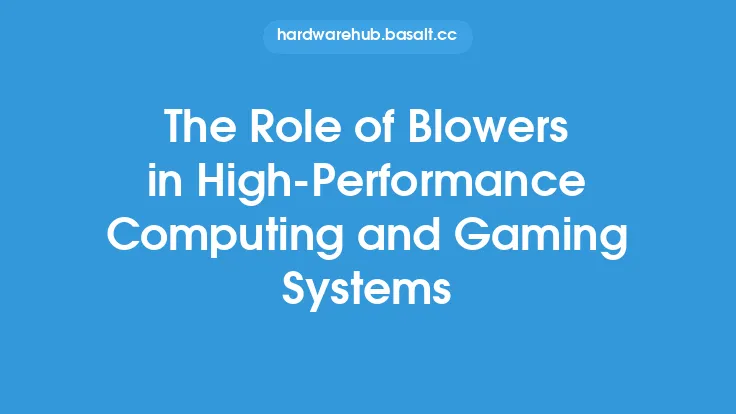When it comes to building a high-performance gaming computer, one of the most critical components is often overlooked: the power supply. While many enthusiasts focus on the latest graphics cards, processors, and RAM, a good power supply is essential for delivering stable and efficient power to all components. In the context of overclocking and gaming performance, a high-quality power supply plays a vital role in ensuring that the system can handle the increased power demands of overclocked components and demanding games.
Introduction to Power Supply and Overclocking
Overclocking involves pushing the computer's components to run at higher speeds than their default settings, which can result in increased power consumption. A good power supply must be able to handle this increased power demand without compromising on stability or efficiency. The power supply's capacity to deliver clean and stable power is crucial for maintaining the system's overall performance and preventing damage to the components. In addition, a power supply with high efficiency and low noise levels can help to reduce the overall noise level of the system and improve its reliability.
Power Supply Specifications and Overclocking
When selecting a power supply for overclocking and gaming, there are several key specifications to consider. The most important specification is the power supply's wattage, which is measured in watts (W). The wattage rating indicates the maximum amount of power that the power supply can deliver to the system. For overclocking and gaming, a higher wattage power supply is often required to handle the increased power demands of the components. However, it's essential to choose a power supply with a wattage rating that matches the system's power requirements, as excessive wattage can lead to inefficiency and increased power consumption.
Another critical specification is the power supply's efficiency, which is measured by the 80 PLUS certification program. The 80 PLUS program certifies power supplies based on their efficiency at different load levels, with higher certifications indicating higher efficiency. For example, an 80 PLUS Gold certified power supply is at least 90% efficient at 50% load, while an 80 PLUS Platinum certified power supply is at least 92% efficient at 50% load. Higher efficiency power supplies can help to reduce power consumption, heat generation, and noise levels.
Power Supply Rail Distribution and Overclocking
The power supply's rail distribution is also crucial for overclocking and gaming performance. The rail distribution refers to the way the power supply delivers power to the different components in the system. A good power supply should have a robust 12V rail, which is the primary rail for delivering power to the CPU, GPU, and other components. The 12V rail should be able to handle high currents and have low ripple and noise levels to ensure stable power delivery.
In addition, the power supply's modular design can also impact its performance in overclocking and gaming applications. A modular power supply allows for easier cable management and can help to reduce clutter and improve airflow within the case. However, it's essential to choose a power supply with high-quality modular cables that can handle high currents and have low resistance.
Power Supply Noise and Ripple in Overclocking
Power supply noise and ripple can also impact the system's performance in overclocking and gaming applications. Noise and ripple refer to the AC components that are present in the power supply's output, which can cause instability and damage to the components. A good power supply should have low noise and ripple levels, typically measured in millivolts (mV). The ATX specification recommends a maximum noise and ripple level of 120mV for the 12V rail, while high-end power supplies often have noise and ripple levels below 50mV.
Overclocking and Gaming Performance
In terms of overclocking and gaming performance, a good power supply can make a significant difference. A power supply with high efficiency, low noise levels, and robust rail distribution can help to improve the system's overall performance and stability. In addition, a power supply with high-quality components and a robust design can help to reduce the risk of component failure and improve the system's reliability.
For example, a system with a high-end graphics card and overclocked CPU can benefit from a power supply with a high wattage rating and robust 12V rail. The power supply's high efficiency and low noise levels can help to reduce power consumption and heat generation, while its robust rail distribution can help to ensure stable power delivery to the components.
Conclusion
In conclusion, a good power supply is essential for delivering stable and efficient power to all components in a gaming computer, particularly in overclocking applications. When selecting a power supply for overclocking and gaming, it's essential to consider key specifications such as wattage, efficiency, and rail distribution. A power supply with high efficiency, low noise levels, and robust rail distribution can help to improve the system's overall performance and stability, while reducing the risk of component failure and improving reliability. By choosing a high-quality power supply, enthusiasts can ensure that their system can handle the demands of overclocking and gaming, and provide a stable and efficient platform for their components to perform at their best.





